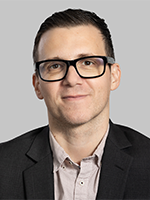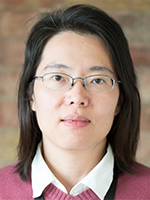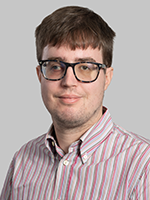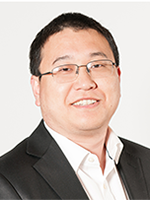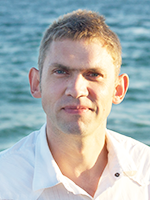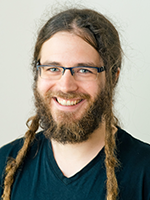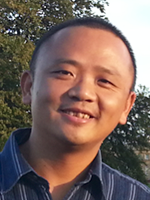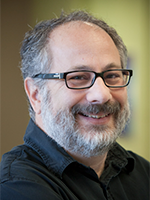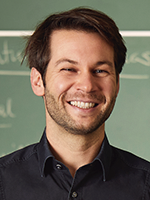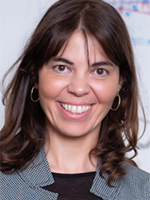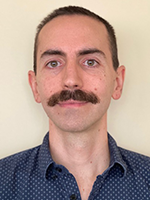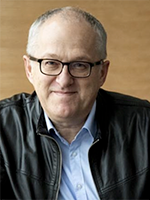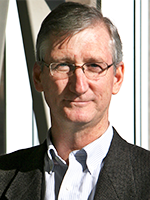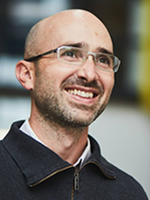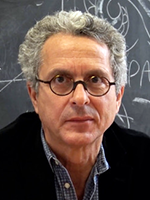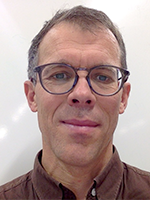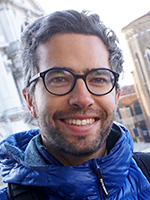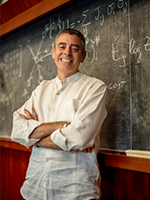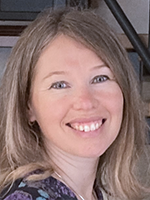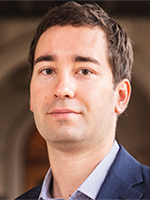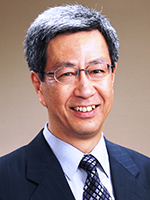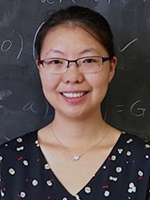Editorial Board of Physical Review X
APS Publications Leadership and Management
Editorial Roles in the Physical Review Journals
Editors of Physical Review X
Ling Miao, Chief Editor
American Physical Society, USA
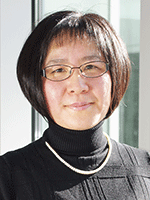
Ling Miao received her B.Sc. in theoretical high-energy physics from the University of Science and Technology of China and her Ph.D. in statistical physics, soft condensed matter physics, and biophysics from Simon Fraser University in Canada. She also has a strong interest in a broad range of subject areas of physics beyond those of her specialization. She was an Associate Professor in Physics at the University of Southern Denmark before joining Physical Review Letters as an editor in 2005. In 2022, she was elected a Fellow of American Physical Society for leading the APS journals in new directions as the inaugural Managing Editor of PRX.
Denis Bartolo, Lead Editor
ENS de Lyon, France
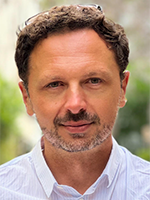
Denis Bartolo is a Professor of Physics at ENS de Lyon, France. He likes combining experiments and theory to investigate a variety of collective phenomena in soft condensed matter. Current topics include active-matter hydrodynamics, topological aspects of mechanics and crowd dynamics. After studying experimental physics and chemistry, he completed his Ph.D. in theoretical physics at ESPCI-Paris and Sorbonne University. He joined Université Paris Cité as an assistant professor in 2006, and became a full professor at ENS de Lyon in 2012. In 2021, he was elected a fellow of the American Physical Society and his research on active matter physics received the support of the European Research Council.
|
|
Dario Corradini, Associate EditorAmerican Physical Society, USA Dario Corradini received his Ph.D. in computational physics from University Roma Tre, Italy. He did his postdoctoral research at Boston University and as a CNRS research fellow at Pierre and Marie Curie University (Paris) and at École Normale Supérieure. His research interests include theoretical statistical physics of complex liquids and ionic materials, as well as biological and environmental physics. |
|
|
Yun Li, Associate EditorAmerican Physical Society, USA Yun Li received her Ph.D. from a joint program between Pierre and Marie Curie University in Paris and East China Normal University in China, performing theoretical research in the field of ultracold quantum gases. She worked as a DECREA Fellow at Swinburne University of Technology in Melbourne, Australia, after two postdoctoral stints at the University of Trento in Italy and at the National University of Singapore. Before joining PRX in 2021, she was a senior editor of Nature Physics. |
|
|
Mauro Schiulaz, Associate EditorAmerican Physical Society, USA Mauro Schiulaz received his Ph.D. from the International School for Advanced Studies (ISAS) in Trieste, Italy. He most recently worked as a postdoctoral research associate at Yeshiva University where he performed research in quantum chaotic systems, many-body localization, and open quantum systems. His previous postdoctoral work was at Boston University where he performed research in classical disordered systems, detonations in inhomogeneous systems, and disordered superconductors. He became a full-time member of the PRX editorial team September, 2019. |
|
|
Paul Snijders, Associate EditorAmerican Physical Society, USA Paul received his M.Sc. in Materials Science and Technology at the Delft University of Technology in The Netherlands working on the characterization of the structure of ultrathin disordered oxide films using photoelectron spectroscopy. He received his Ph.D. at the Kavli Institute of Nanoscience at the Delft University of Technology studying electronic instabilities and structural fluctuations in self-assembled atom wires. He worked as a Wigner Fellow and research staff member at the Oak Ridge National Laboratory for 10 years before joining PRB in 2017. He is now a part-time member of the PRX editorial team. |
|
|
Yiming Xu, Associate EditorAmerican Physical Society, USA Yiming Xu received his B.Sc. from Nanjing University in China and his Ph.D. from Boston College, both in experimental condensed matter physics. Prior to joining PRX in 2014, he was a postdoctoral fellow in the Materials Sciences Division at Lawrence Berkeley National Laboratory. His research focus was on the electronic properties of strongly correlated materials. |
|
|
Victor Vakaryuk, Senior Associate EditorAmerican Physical Society, USA Victor Vakaryuk received his Ph.D. from the University of Illinois at Urbana-Champaign. He worked as a postdoctoral researcher at Argonne National Lab and at Johns Hopkins University. His research topics include exotic superconductivity, graphene, and transport in nanostructures. He joined PRB in 2013 and is now a long-term, part-time member of the PRX editorial team. |
Consulting Editors
|
|
Marcus Huber, Consulting EditorIQOQI, Austrian Academy of Sciences, Austria Marcus Huber is a group leader at the Institute for Quantum Optics and Quantum Information (IQOQI) of the Austrian Academy of Sciences, Vienna. He completed his Ph.D. at the University of Vienna in 2010 and has since worked at the University of Bristol, Universitat Autonoma de Barcelona, the Institute of Photonic Sciences (ICFO) and the University of Geneva. His research focus is currently connected to high-dimensional quantum information and the exploration of thermodynamics of quantum systems. His interdisciplinary group covers mathematical, foundational as well as applied-theoretical and sometimes even experimental research. |
|
|
Bill Munro, Consulting EditorOkinawa Institute of Science and Technology, Japan Bill received his Ph.D. in physics from the University of Waikato (NZ) in 1995. Having spent over twenty years of his career as an industrial research scientist, holding senior positions within both HP Labs and NTT Basic Research Laboratories, he joined the Okinawa Institute of Science and Technology in 2023. He served as a Board member of PRA from 2013 to 2018 and became an Associate Editor of PRA and consulting editor of PRX in 2019. His main research interests are focused in quantum optics, quantum networking, quantum computation and hybrid quantum systems. Bill is also an APS, Optica, and IOP Fellow. |
Editorial Board
|
|
Iacopo Carusotto, Quantum fluids and topological photonicsIstituto Nazionale di Ottica, CNR-INO, Trento, Italy Iacopo Carusotto is a Research Director of INO-CNR at the BEC Center in Trento, a joint initiative of INO-CNR and Trento University. His group performs interdisciplinary research in different areas of quantum-optics-related research including nonlinear, quantum and topological photonics, quantum fluids of ultracold atoms and of light, analog models of gravity and analog black holes based on condensed matter and optical systems. |
|
|
Aashish Clerk, Quantum optics and condensed matter physicsUniversity of Chicago, USA Aashish Clerk is a theoretical physicist and Professor in the Institute of Molecular Engineering at the University of Chicago. His group's research is at the intersection of quantum optics, condensed matter physics, and quantum information. A general theme is the physics of driven-dissipative quantum systems, with an emphasis on engineered quantum systems such as superconducting circuits and optomechanical cavities. He is a past recipient of an Alfred P. Sloan Research Fellowship, the Rutherford Memorial Medal of the Royal Society of Canada, and the E.W.R. Steacie Fellowship of Canada's National Sciences and Engineering Research Council (NSERC). |
|
|
Xi Dai, Condensed matter physicsHong Kong University of Science and Technology, Hong Kong Xi Dai is Professor of Physics at Hong Kong University of Science and Technology. His research group covers the electronic structure studies on topological and strongly correlated materials. Using modern computational techniques for electronic structure study, he and his group have predicted several very important topological materials, including the Bi2Se3 family as 3D topological insulators, Cr-doped Bi2Te3 thin film as a quantum anomalous Hall system, and the TaAs family as Weyl semimetals. He received the “Achievements in Asia Award” in 2012 from The International Organization of Chinese Physicists and Astronomers (OCPA) and the “Fundamental Physics Prize” in 2014 from the K. C. Chou Foundation. He has been listed as a “Highly Cited Researcher” by Thomson Reuters since 2014, and is a Fellow of the American Physical Society. He also serves on the Editorial Board of Physical Review Materials. |
|
|
Mark Dean, Experimental condensed matter physicsBrookhaven National Laboratory, USA Mark Dean is a Physicist in the Condensed Matter Physics and Materials Science Department at Brookhaven National Laboratory. His research program is centered on resonant elastic and inelastic x-ray scattering studies of high temperature superconductors, strongly spin-orbit coupled materials, and complex oxide heterostructures. In 2014 he was a recipient of the Department of Energy Early Career Award. |
|
|
Thomas Devereaux, Condensed matter physicsStanford University and SLAC National Accelerator Laboratory, USA Thomas Devereaux is a professor in Materials Science & Engineering and Photon Science at Stanford University and SLAC National Accelerator Laboratory, and a Senior Fellow of the Precourt Institute for Energy. He received his Ph.D. in 1991 from the University of Oregon. He was formerly the Director of the Stanford Institute for Materials and Energy Sciences (SIMES) from 2011-2020. He is a Fellow of the Alexander von Humboldt Foundation (2002), the American Physical Society (2008) and the American Association for the Advancement of Science (2024). His main research interests lie in the areas of theoretical condensed matter physics and computational materials science. |
|
|
Sebastian Diehl, Quantum many-body systems, open quantum systemsUniversity of Cologne, Germany Sebastian Diehl is a professor at the Institute for Theoretical Physics at the University of Cologne, Germany. His research focuses on driven open quantum matter—systems at the interface of condensed matter, quantum optics, and quantum information, characterized by an interplay of coherent quantum dynamics with external driving, dissipation, and quantum measurement. He was a recipient of a START grant from the Austrian Science Fund in 2011 and a Consolidator Grant from the European Research Council in 2015. |
|
|
Eric Dufresne, Soft matter and biological physicsCornell University, USA Eric Dufresne is Professor of Physics and Materials Science & Engineering at Cornell University. His research focuses on the physics of soft and living materials. Current topics include morphogenesis, interfacial properties, and mechanics in biological and synthetic systems. Before moving to Cornell, Eric Dufresne was a professor at the Swiss Federal Institute of Technology in Zurich (ETH). In recognition for his broad contributions to soft matter research, he was awarded the 2014 Soft Matter Lectureship by the Royal Society of Chemistry and elected a Fellow of the American Physical Society in 2022. |
|
|
Roel Dullens, Experimental soft matter physicsRadboud University Nijmegen, Netherlands Roel Dullens is Professor of Physical Chemistry of Soft Matter at Radboud University Nijmegen, Netherlands. In his research he combines the development of novel colloidal systems with optical manipulation and imaging techniques to study, for example, colloidal grain boundaries, liquid crystals, and driven systems. Before moving to Nijmegen, he was a professor at the University of Oxford, UK, and he received his Ph.D. from Utrecht University, Netherlands. His research has been supported by the European Research Council via a Starting Grant in 2011 and a Consolidator Grant in 2016. In 2019, he was awarded the Corday-Morgan Prize and the McBain Medal for his contributions to (soft) condensed matter science. |
|
|
Donglai Feng, Experimental condensed matter physicsUniversity of Science and Technology of China, China Donglai Feng is a professor of physics at the University of Science and Technology of China. His research focuses on the electronic structure of highly correlated electron systems and their artificial microstructures, including high-temperature superconductors, Mott insulators, magnetic materials, low-dimensional systems, topological materials, etc. His experimental expertise includes angle-resolved photoemission spectroscopy, x-ray spectroscopy and scattering, scanning tunneling microscopy, molecular beam epitaxy. He is an academician of the Chinese Academy of Sciences and a Fellow of the American Physical Society. |
|
|
Francesca Ferlaino, Quantum gases, atomic physics, quantum few- and many-body physicsUniversity of Innsbruck, Austria Francesca Ferlaino is an experimental AMO physicist. She received her Ph.D. at the University of Florence in 2004, and she is currently professor at the University of Innsbruck, Research Director at the Institute for Quantum Optics and Quantum Information (IQOQI, ÖAW), and in the Board of Directors of the Cluster of Excellence “Quantum Science Austria”. Her research explores few- and many-body quantum physics using ultracold atoms and molecules, interacting via long-range forces. Recently, she focused on creating quantum gases with multielectron atoms possessing large magnetic dipole moments to access novel dipolar phenomena. Dr. Ferlaino’s awards include the Grand Prix de Physique "Cécile-DeWitt Morette” from the French Academy of Science, the Erwin Schrödinger Prize, the Junior BEC Award, and three ERC grants. |
|
|
Steven Flammia, Quantum information and quantum computationAWS Center for Quantum Computing, USA Steven Flammia is a Principal Research Scientist at the AWS Center for Quantum Computing, and prior to that was a Professor in the School of Physics at the University of Sydney. His research addresses two aspects of noise in quantum devices: how to efficiently estimate quantum noise, and how to effectively eliminate noise using quantum error correction and quantum fault tolerance. He proudly serves on the steering committees of the two major quantum information theory conferences, QIP and TQC. He was awarded an ARC Future Fellowship from 2014–2018 and received the Pawsey Medal of the Australian Academy of Science in 2019 for his work on quantum noise metrology. He has been elected a Fellow of the American Physical Society in 2022. |
|
|
Erwin Frey, Statistical Physics, soft matter physics, biophysicsUniversity Ludwig-Maximilians Munich, Germany Erwin Frey is Professor of statistical and biological physics at University Ludwig-Maximilians Munich, Germany. His group works at the interface of physics, nanoscience, and biology, focusing on theoretical approaches to understand emergent phenomena in complex biomolecular systems, e.g., the cytoskeleton, intercellular transport processes, self-assembly processes, and pattern formation. He received several honors and awards, including the Max Planck Medal in 2024, being named Kavli Chair at the Delft University of Technology and participating in the Colloquium Ehrenfestii at Leiden University, both in 2019. |
|
|
Bruce Gaulin, Experimental condensed matter physicsMcMaster University, Canada Bruce Gaulin is Distinguished University Professor and Brockhouse Chair in the Physics of Materials at McMaster University, where he serves as Director of the Brockhouse Institute for Materials Research. His research expertise lies in the application of forefront neutron and x-ray scattering techniques to topical problems in quantum materials, often involving exotic magnetic ground states. He is a Fellow of the Royal Society of Canada, the American Physical Society, and the Neutron Scattering Society of America (NSSA). Gaulin has served as President of the NSSA and is currently Vice-President of the Canadian Association of Physicists. |
|
|
Benjamin Huard, Experimental quantum information, quantum technologies based on superconducting devicesEcole Normale Supérieure, France Benjamin Huard is a Professor of Physics at Ecole Normale Supérieure in Lyon, France. He conducts experimental and theoretical work on quantum information and superconducting circuits. He has worked on quantum measurement and feedback, quantum sensing, thermodynamics of quantum information, microwave quantum optics, and quantum error correction. He did his Ph.D. studies on mesoscopic physics at CEA Saclay (France) with Hugues Pothier and a postdoc on graphene in the Goldhaber-Gordon group at Stanford University (USA). He joined CNRS in 2008 to work at Ecole Normale Supérieure in Paris and became a full professor at ENS de Lyon in 2016. He has been a scientific advisor of the company Alice & Bob since 2021. |
|
|
Benjamin Lev, Quantum optics, quantum gases, quantum many-body physicsStanford University, USA Benjamin Lev is a Professor in the Departments of Physics and Applied Physics at Stanford University. He explores quantum many-body physics using techniques at the interface of quantum gas physics, quantum optics, and condensed matter physics. Recent focus has been on excited 1D dipolar gases; confocal cavity QED for creating dynamical lattices, spin glasses, and neural networks; and scanning probe microcopy with quantum gas sensors. Lev received his A.B. from Princeton in 1999 and his Ph.D. from Caltech in 2005. His awards include a David and Lucile Packard Foundation Fellowship, an NSF CAREER Award, the Presidential Early Career Award for Scientists and Engineers, and young investigator awards from the Air Force, Navy, and DARPA. He is a Fellow of the American Physical Society. |
|
|
Victor Malka, Laser-plasma interaction and particle acceleratorsThe Weizmann Institute of Science, Israel For three decades, Victor Malka was a CNRS Research Director at Laboratoire d’Optique Appliquée and a Professor at Ecole Polytechnique. He is now a Professor at the Weizmann Institute of Science in Israel. He has worked on a range of topics, including atomic physics, inertial fusion, and laser-plasma interaction. His current work is mainly devoted to relativistic laser-plasma interaction, laser-plasma accelerators and related technological applications aimed for societal impact. He is a Fellow of the American Physical Society and the European Physical Society and an Officer of the Physics Division of the European Academy of Science. He has been awarded two Advanced Grants and three Proof-of-Concept Grants from the European Research Council. |
|
|
Xavier Marie, Condensed matter physics, semiconductor optoelectronicsUniversity of Toulouse, France Xavier Marie is Professor of Physics at the National Institute of Applied Sciences (INSA) at the University of Toulouse and also Director of the Laboratory of Excellence NEXT (Nano, EXtreme measurements and Theory). He has been a Senior Member at the Institut Universitaire de France since 2015. His research focuses on electronic and optical properties of low-dimensional semiconductor structures (quantum wells, quantum dots, 2D materials). His current research topics include the optical, electronic, and spin coherence in semiconductor nanostructures and band structure engineering of semiconductors for optical telecommunication devices and solar cells. |
|
|
Igor Mazin, Condensed matter physicsGeorge Mason University, USA Igor Mazin is now a professor in the Department of physics at George Mason University after his long service at the Center for Materials Science and Technology of the Naval Research Laboratory. His main research interest is in combining analytical and computational methods to advance electronic theory of superconducting, magnetic, and other solid-state materials. He has been a Fellow of the American Physical Society since 2004 and received the 2018 Bardeen Prize for his work on superconductivity. He was on the 2014 Thomson-Reuters list of the world's most influential scientific minds. From 2010 to 2015 he served on the Editorial Board of Physical Review B. |
|
|
Iain Moore, Experimental nuclear physics, in particular, using laser spectroscopyUniversity of Jyväskylä, Finland Iain Moore is currently a Professor of Physics at the University of Jyväskylä, Finland. His research group combines methodology from nuclear, atomic, and laser physics for the study of the structure of exotic nuclei, as well as in the production and manipulation of rare isotope beams. He holds a number of international positions including acting as current Spokesperson for the LaSpec collaboration at the future facility, FAIR, Germany. |
|
|
John Morton, Experimental nanoelectronics and nanophotonicsUCL, United Kingdom John Morton is Professor of Nanoelectronics & Nanophotonics at the London Centre for Nanotechnology at UCL, and Director of UCL Quantum Science and Technology Institute, UCLQ. His group studies the quantum dynamics of electron and nuclear spins in materials and nano-devices, towards applications in quantum computing and sensing. His awards include the Raymond and Beverly Sackler International Prize in Physical Sciences, Moseley Medal and Prize (Institute of Physics), Nicholas Kurti European Science Prize, and Cavendish Medal (SET for Britain). He is a recipient of European Research Council Starter and Consolidator Grants and is a Fellow of the Institute of Physics. |
|
|
Johnpierre Paglione, Experimental condensed matter physicsUniversity of Maryland, USA Johnpierre Paglione is a Professor of Physics and Director of the Center for Nanophysics and Advanced Materials at the University of Maryland. His team has contributed to several fields of experimental condensed matter research through both single-crystal synthesis of superconducting, quantum-critical and topological materials, as well as exploration of novel phenomena. He is a leader in the field of quantum criticality and has made important contributions to the understanding of heavy-fermion materials and the quasiparticle picture of correlated materials. Recently, he has pursued several new areas of research including iron-based high-temperature superconductivity and topological insulators and superconductors. He is the recipient of a National Postdoctoral Fellowship Award from the Natural Sciences and Engineering Council of Canada, a National Science Foundation CAREER Award and an Early Career Award from the Department of Energy, a Gordon and Betty Moore Foundation Materials Synthesis Award, and is a Fellow of the American Physical Society. |
|
|
Cindy Regal, Experimental atomic, optical, and mesoscopic physicsJILA, USA Cindy Regal is a Fellow of JILA, a joint institute between the University of Colorado and NIST, and an Associate Professor of Physics at the University of Colorado. Her experimental work in quantum physics lies at the interface of atomic physics, optical sciences, and solid-state devices. She was a recipient of a David and Lucile Packard Foundation Fellowship and is a Fellow of the American Physical Society. |
|
|
Federico Ricci Tersenghi, Statistical and computational physics, machine learningSapienza University of Rome, Italy Federico Ricci-Tersenghi is a Professor of Theoretical Physics at Sapienza University of Rome, Italy. He received his Ph.D. in Physics in 1999 under the supervision of Nobel Laureate Giorgio Parisi and was awarded the Tomassoni-Chisesi Prize in 2008. His research focuses on studying strongly disordered models, especially spin glasses, and applying statistical physics to combinatorial optimization, inference problems, and machine learning in general. His expertise ranges from large-scale numerical simulations to advanced analytical tools, from optimized Monte Carlo and message-passing algorithms to sophisticated mean-field theories and replica/cavity methods. |
|
|
Achim Rosch, Condensed matter theoryUniversity of Cologne, Germany Achim Rosch is professor of theoretical physics at the University of Cologne in Germany. He received his Ph.D. from University of Karlsruhe in 1997. He works on transport and dynamics of correlated and topological matter, including the physics of magnetic skyrmions, systems far from thermal equilibrium, topological insulators and semimetals, Kitaev materials, low-dimensional systems, quantum phase transitions, ultracold atoms, often in collaboration with experimental groups. He received the Leibniz Prize of the German Research Foundation in 2013 and the EPS Europhysics Prize of the European Physical Society in 2016 for his work on magnetic skyrmions. |
|
|
Olga Smirnova, Ultrafast atomic, molecular, and materials scienceMax Born Institute and Technical University of Berlin, Germany Olga Smirnova graduated from the Physics Department of the Moscow State University in 1996 and received her Ph.D. there in 2000, continuing as assistant professor. In 2003 she received the Lise-Meitner Fellowship of Austrian Science Foundation (FWF) and joined the Vienna University of Technology as a postdoctoral fellow. In 2005 she moved to the National Research Council (NRC) in Ottawa, Canada, where she became a permanent staff scientist in 2006. In 2009 she received the SAW award of the Leibniz society and moved to the Max Born Institute to establish her own Strong Field Theory research group, which she continues to lead. Since 2016 she also holds full professorship at the Technical University Berlin. Olga received the Karl-Scheel-Preis of Physikalischen Gesellschaft zu Berlin in 2010 and the Ahmed Zewail Award in Ultrafast Science & Technology of the American Chemical Society in 2020 for her “pioneering contributions in attosecond strong-field physics, including attosecond high harmonic spectroscopy of electron dynamics and the discovery of electron spin polarization during optical tunneling.” Olga’s current research focuses on imaging and control of ultrafast electron dynamics in atoms, solid state materials, and molecules, especially chiral molecules. |
|
|
Jeff Thompson, Atomic physics, quantum optics, and quantum technologyPrinceton University, USA Jeff Thompson is an Associate Professor of Electrical and Computer Engineering at Princeton University, where he is also an associated faculty member in the Department of Physics. His research focuses on experimental atomic physics and quantum optics, with application to quantum technologies. Current projects include neutral atom quantum computing using a novel atomic species, ytterbium, and the development of telecom-band quantum network nodes based on single erbium ions in solid-state nanophotonic devices. His work has been recognized by several awards including the Presidential Early Career Award for Scientist and Engineers, the DOE Early Career award, NSF CAREER, and the New Horizons Prize in Physics. |
|
|
Mikhail Tikhonov, Theoretical physics, Ecology, and EvolutionWashington University in St. Louis, USA Mikhail Tikhonov is a theoretical physicist and an Assistant Professor at Washington University in St Louis. His group applies ideas and methods from statistical physics to study eco-evolutionary feedbacks in high-diversity microbial ecosystems, and evolution in changing or fluctuating environments. He received his Master's degree from Ecole Normale Superieure in 2009 and his Ph.D. from Princeton in 2014. Other interests include information theory and bioinformatics. |
|
|
Kiyoshi Ueda, Atomic, molecular and cluster science, ultrafast X-ray scienceTohoku University, Japan Kiyoshi Ueda is a professor at the Institute of Multidisciplinary Research for Advanced Materials at Tohoku University. His research interest focuses on electronic and structural dynamics of various forms of matter. His group has been developing and applying a range of spectroscopic and imaging techniques that use low-emittance synchrotron radiation, femtosecond lasers, and short-wavelength (XUV--X-ray) free-electron lasers (FELs) to study such dynamics. He was an international councillor of the American Physical Society from 2014 to 2017. He regularly serves on the international review panels for large light-source facilities, including GSI Helmholz Center, MPI center at CFEL, LCLS at SLAC, FLASH at DESY, FERMI at Elettra, and also serves on review panels for their research programs and proposals. |
|
|
Lenka Zdeborová, Theoretical statistical physics, machine learning, algorithmsÉcole Polytechnique Fédérale de Lausanne, Switzerland Lenka Zdeborová is a Professor of Physics and of Computer Science and Communication Systems at École Polytechnique Fédérale de Lausanne, Switzerland. Her research is in applications of methods developed in statistical physics, such as advanced mean-field theories, replica method, and related message-passing algorithms, as well as problems in machine learning, signal processing, inference, and optimization. In 2014, she was awarded the CNRS bronze medal and in 2016 she was the recipient of the Philippe Meyer Prize in theoretical physics and an ERC starting grant. She was awarded the Prix Irène Joliot-Curie in 2018. |
|
|
Liuyan Zhao, Experimental condensed matter physicsUniversity of Michigan, USA Liuyan Zhao is an associate professor of physics at the University of Michigan, Ann Arbor. Her research focuses on probing, controlling, and creating electronic and magnetic phases in solid state systems, including three-dimensional and two-dimensional materials. Her experimental expertise includes nonlinear, ultrafast, and inelastic optical spectroscopy and microscopy, and scanning tunneling microscopy. Her work has been recognized by several awards including NSF CAREER, AFOSR YIP, and Sloan Fellowship. |
